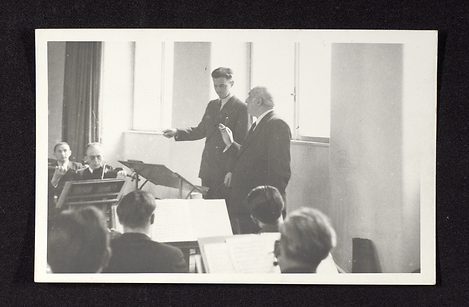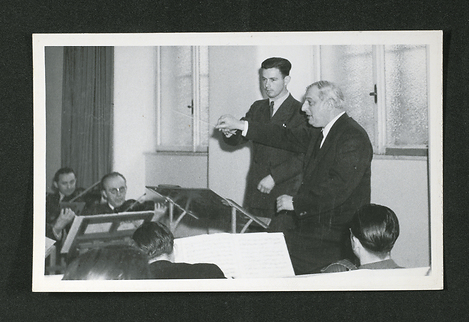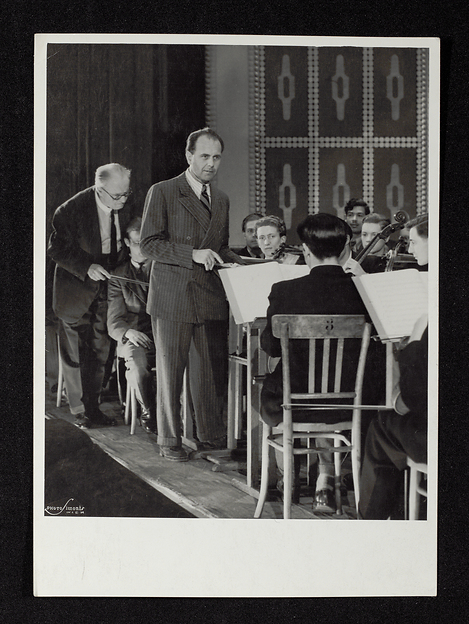Historical Development of the field of Music Direction at the mdw
"Make an effort to conduct clearly and understandably, but don't overestimate technique, don't forget that it is the orchestral musician who makes the music and respect them for that. Use all your energy - if it is music of the masters - on the connections of the form! Empty prettiness or wild grimaces on the podium contribute nothing to the true effect, they are only a sign of stupidity."
From a letter by Hans Swarowsky to his students on the occasion of his farewell from the university in May 1975, to be read at https://hansswarowsky.com/en/4807-letter-to-students-may-1975.php

(c) Photo Simonis
In 1909, the Board of Trustees of the Imperial and Royal Academy of Music and Performing Arts in Vienna established a two-year course in Kapellmeister training. After the relocation of all courses of the Imperial and Royal Academy of Music from the Musikverein to Lothringerstraße in 1913, Franz Schalk, Court Kapellmeister at the Vienna Court Opera (today the Vienna State Opera), was entrusted with the direction of the course.
Two years of successful composition studies at the house were required as previous knowledge, as well as proof of good ear (through dictation) and dexterous piano playing, practice in accompaniment and transposing.
The curriculum in the first year included score playing, accompaniment, form analysis, instrumentation and learning to play a string instrument. Also a large workload of practical experience through attending and accompanying singing classes as well as attending and accompanying rehearsals of the opera school, attending class concerts and compulsory attendance in various instrumental training classes.
In addition, there were lectures by the director of the Kapellmeister school on the most important works of opera and concert literature, including form analysis, explanation of the technical structure, discussion of the peculiarities and difficulties of interpretation.
In the second year one had to additionally study instrumentation and a wind instrument and was now allowed to actively participate in orchestra exercises at the Kapellmeister school.
In 1924, a specialist school for music and the performing arts was established parallel to the academy and, among other things, the Kapellmeister training was outsourced. The curriculum was not changed significantly, but the number of hours per week was increased from six to ten. The experiment at the specialist school was terminated in 1931 and the studies there were returned to the State Academy.
In 1933, the syllabus was revised again, but previous knowledge of composition remained a condition for the entrance examination. The fact that "easy scores and more difficult piano excerpts (Wagner, Strauss) to be played from sight" were now required, raised the pianistic requirements even higher.
In 1939 the academy became a college, in 1941 a Reichshochschule, only to become an academy again in 1946. The efforts to establish a college, which had been known since the 1920s, did not lead to success until 1970. Finally, the Academy of Music and Performing Arts became the University of Music and Performing Arts in 1999.
In 1946, Hans Swarowsky accepted his professorship in conducting at the then Academy of Music and Performing Arts Vienna - his artistic genius left a lasting mark on the institute and exerted a decisive influence on conductors to come. Among his many world-famous students are Gustav Leonhardt, Claudio Abbado, Mariss Jansons, Zubin Mehta, Ádám Fischer, Heinrich Schiff and Michael Radulescu.
The year 1949 marks the first opportunity for students to work with a professional orchestra. Clemens Krauss had engaged the Lower Austrian Tonkünstler Orchestra.
Final concerts of the conducting students are documented from 1957 and are still a tradition today.
With the academic year 1960/61, a far-reaching study reform came into effect for the first time: the courses for conducting, choral conducting and opera accompaniment were merged, extended to four years and for the first time there is evidence of the plan to found a department for music direction, which, however, could not yet be implemented.
The aim of the reform, as recorded in a remark by the Academy President Hans Sittner in a meeting in 1960, was "to place the training of the Kapellmeisters on a serious basis corresponding to the international level" and "thus to be able to guarantee a good training not only for the most talented students, as before, but for the average". (mdw archives, o.Z., minutes of the meeting on the reorganisation of the Kapellmeisterschule of 05.07.1960 in 3534/1960, in: 3447/1960, in: collective file department of music direction, Zl. 4147/1958 S.M.)
Until 1988, the three study areas were combined in the "Conducting Studies". From 1988/89 they were renamed "Music Direction Studies" and extended to six years (12 semesters).
In 2002, the independent Institute for Music Direction was finally founded. The curriculum, now running on a university basis, was continued as a diploma programme and, from the academic year 2003/04, was again reduced to 10 semesters, with the two study sections being divided into four semesters up to the 1st diploma and six semesters up to the 2nd diploma. The duration of the two sections was reversed in 2019, and the three sections of orchestral conducting, choral conducting and opera correpetition were changed so that the specialisation can already be chosen upon entry into the programme and no longer, as was the case until 2019, only in the second section of the programme.
Work is currently underway to convert the five-year diploma degree programme to a six-year bachelor's-master's system, to be offered from the academic year 2024/25.
Professors of Conducting
1909 – 1919 Franz Schalk
1919 – 1922 Ferdinand Löwe
1922 – 1924 Clemens Krauss
1924 – 1926 Dirk Fock
1926 – 1927 Robert Heger
1927 – 1931 Alexander Wunderer
1931 – 1935 Oswald Kabasta
1935 – 1938 Felix Weingartner
1938 – 1945 Leopold Reichwein
1945 – 1946 Josef Krips
1946 – 1946 Hermann Schmeidel (Vertretung Krips)
1946 – 1975 Hans Swarowsky (Emeritierung 1970)
1948 – 1949 Josef Krips
1964 – 1992 Karl Österreicher (von 1964-1970 als Assistent von Swarowsky)
1977 – 1990 Othmar Suitner
1991 – 2012 Uros Lajovic
1992 – 2004 Leopold Hager
Seit 2004 Mark Stringer
2012 – 2022 Johannes Wildner
Seit 2022 Andrès Orozco-Estrada
Seit 2022 Sian Edwards
Historical overview of choral direction/choral conducting at the mdw
In Richard von Perger's and Robert Hirschfeld's History of the Imperial and Royal Society of Friends of Music in Vienna, the founding of the Choral Conducting School is given as 1904/05. However, according to the entry in his personnel file[1], Eugen Thomas, who was entrusted with its direction, was not employed until 1 September 1905. Newspaper reports also attest that the school began in the 1905/06 school year.[2]
In 1919, choral conducting was integrated into the Kapellmeister school (Thomas, who was not very happy about this, took over the teaching of harmony, general music theory and choral practice). In the complaint he made[3], he elaborated a little on the teaching content or his understanding of it:
"To be a choral conductor (not to be confused with 'choirmaster' or with ‘cantor’), one must be carefully prepared, know the musical literature up to the year 1600 (which until then was almost exclusively choral singing) and, of course, beyond that, have made detailed theoretical studies of the old styles - routine time beaters [sic] do little here - and be familiar with singing. One must also be a composer in order to be able to breathe new life into the old works, which are without any performance signs, one must have a command of foreign languages in order to be able to understand the text in the old French, English and Italian choral literature: one must also have a precise knowledge of the instrumental music of the time after 1600, and so on.
All this has so far been taught theoretically and practically only in the Choral Conducting School of the Vienna Academy of Music, and has also been demonstrated practically by concerts of the Choral School."[4]
From 1928/29, the choral conducting school was reintroduced and cathedral conductor Ferdinand Habel was entrusted with its direction.t
The answer to an enquiry from the Kapellmeister Union of Austria in 1937 concerning the creation of a choral conducting school[5] confirms that such a school still existed at the Academy. An advertisement placed by the Academy in 1940 does list the Choral Conducting School as one of the subjects offered,[6] but it is not to be found in the "Study-overview for the year 1940/41"[7] - neither as one of the studies offered nor as one of the subjects taught by Habel.
Habel was retired in 1946, at which point at the latest the subject seems to have been abandoned: it is not mentioned in the subject statistics of the annual report on the academic years from the summer semester of 1945[8] and only reappears with the introduction of the two-year special course under the direction of Otto Siegl and Reinhold Schmid. The chronicle of the annual report states:
"From the winter semester [1951/52], associate professor Otto Siegl took over the theoretical instruction and professor Dr Reinhold Schmid the practical instruction in the two-year special course 'Choral Conducting."[9]
For the following academic year it is noted that the special course "will continue to be maintained".[10] Due to Siegl's and Schmid's entrustment, it can be assumed that it was organisationally integrated into the music theory and Kapellmeister training department.
From 1960/61, the reform - initially introduced on a trial basis - came into effect, creating the school for conductors, choral conductors and opera accompanists. This was connected with the extension of the training to three years. [11] This was followed in 1964 by an increase to four years.[12]
Historical overview of opera accompaniment at the mdw
In the statutes, until 1920, "attending and accompanying lessons in vocal training classes" is part of the curriculum of the Kapellmeister school.[13] This was run from 1924 to 1931 at the parallel Special School for Music and Performing Arts in Vienna, which had emerged from the Academy. Under the item "Obligatory auxiliary subjects", the curriculum lists "Dramatic instruction (opera school)", which presumably means accompanying in the opera classes.[14]
In the statutes of 1933 and 1935, opera accompaniment is also mentioned as part of the Kapellmeister training: "In both years, piano reduction and score playing, practical accompaniment in the opera classes."[15]
Josef Krips writes in his memoirs about leading the orchestra classes from 1935 to 1938: "Every week I worked early from eight to ten, on Monday with the strings, on Tuesday with the winds, on Wednesday with the whole orchestra, in the afternoon with the singers or with the young kapellmeisters. They had to take part in all the orchestra rehearsals and play the missing parts on two pianos. That was a great exercise for them. They also had to appear at all my rehearsals with the singers."[16] - Since he does not address it specifically, it can only be assumed that this was opera repetition.
No changes in the curricula are known from the National Socialist era; from 1945, the statutes from 1933 applied again.
Gleichsam ex negativo, anhand einer an Swarowsky gerichteten Beschwerde über „Unzulängliche Leistungen der Kapellmeisterschüler als Korrepetitoren“, lässt sich für 1952 die Opernkorrepetition im Dirigierstudium nachweisen:
It can be assumed, on the basis of a complaint addressed to Swarowsky about the "inadequate performance of the Kapellmeister students as accompanists", that there is evidence of opera accompaniment in the conducting studies for 1952:
"All singing teachers unanimously complain that the Kapellmeister students assigned as class accompanists and répétiteurs within the framework of their curriculum fail without exception and completely. I am disconcerted to the point of being shocked by the very detailed reports given to me, according to which our Kapellmeister students are incapable of accompanying even simple Schubert songs or simple Puccini arias in even a somewhat correct or approximately usable manner. [...]"[17]
Allem Anschein nach (es lässt sich nichts Gegenteiliges nachweisen) war die Opernkorrepetition bis zur Reform 1960/61 Teil der Kapellmeisterausbildung. Dass im Zuge der Reform formuliert wurde, die „bisher getrennt geführte Ausbildung der Kapellmeister, Chordirigenten und Korrepetitoren“[18] würde nun in der Dirigenten-, Chorleiter- und Korrepetitorenschule vereint, legt die Korrepetitionsausbildung betreffend allem Anschein nach eine falsche Spur.
To all appearances (there is no evidence to the contrary), opera accompaniment was part of the Kapellmeister training until the reform of 1960/61. The fact that in the course of the reform it was stated that the "previously separate training of conductors, choral conductors and accompaniment"[18] would now be united in the school for conductors, choral conductors and opera accompanists is, to all appearances, a false lead concerning accomaniment training.
[1] mdw-Archive, Personal File Eugen Thomas (Transfer sheet)
[2] See also Die Zeit, 05.09.1905, S. 3.
[3] mdw-Archive, Zl. 321/Pr/1919.
[4] Ibid.
[5] Zl. 255/1937 A.
[6] mdw-Archive, Zl. 2254/1940 A.
[7] State Academy for Music and Performing Arts Vienna (ed.), "Study-overview for the year 1940/41, Vienna 1940.
[8] State Academy for Music and Performing Arts Vienna (ed.), Annual Report. Summer semester 1945. Study year 1945/46-1954/55“, Vienna 1960, Table at S. 369.
[9] Ibid, S. 22.
[10] Ibid, S. 27.
[11] mdw-Archive, Zl. 1573/1962 in: 3747/1960, in: Collection Folder Department of Music Direction, Zl. 4147/1958 S.M.
[12] 2206/1964 A
[13] Imperial and Royal Academy of Music and Performing Arts Vienna. School Statute. II. part: curriculum, Vienna 1913, p. 26 and State Academy for Music and Performing Arts Vienna. School Statute. II. part: curriculum, Vienna 1920, p. 27.
[14] Specialised school of Music and Performing Arts Vienna (ed.), Statute of the Specialised school of Music and Performing Arts Vienna, p. 6 or the same (ed.), Modified Statute of the Specialised school of Music and Performing Arts Vienna (according to decree Zl. 32509/26 of 22.1.1927), p. 6.
[15] State Academy for Music and Performing Arts Vienna (ed.), Statute of the Specialised school of Music and Performing Arts Vienna. II. part: curriculum, Vienna 1933, p. 7 and the same (ed.) State Academy for Music and Performing Arts Vienna (ed.), Statute of the Specialised school of Music and Performing Arts Vienna. Part II: Curriculum, Vienna 1935, p. 7.
[16] Josef Krips, You can't make music without love. Memories. Edited and documented by Harrietta Krips, Vienna-Cologne-Weimar 1994, p. 134.
[17] mdw-Archive, Zl. 3261/1952 A.
[18] mdw-Archive, 3534/1960, in: 3447/1960, in: Collection Folder Department of Music Direction.

(c) Photo Simonis
 (c) Photo Simonis
(c) Photo Simonis
